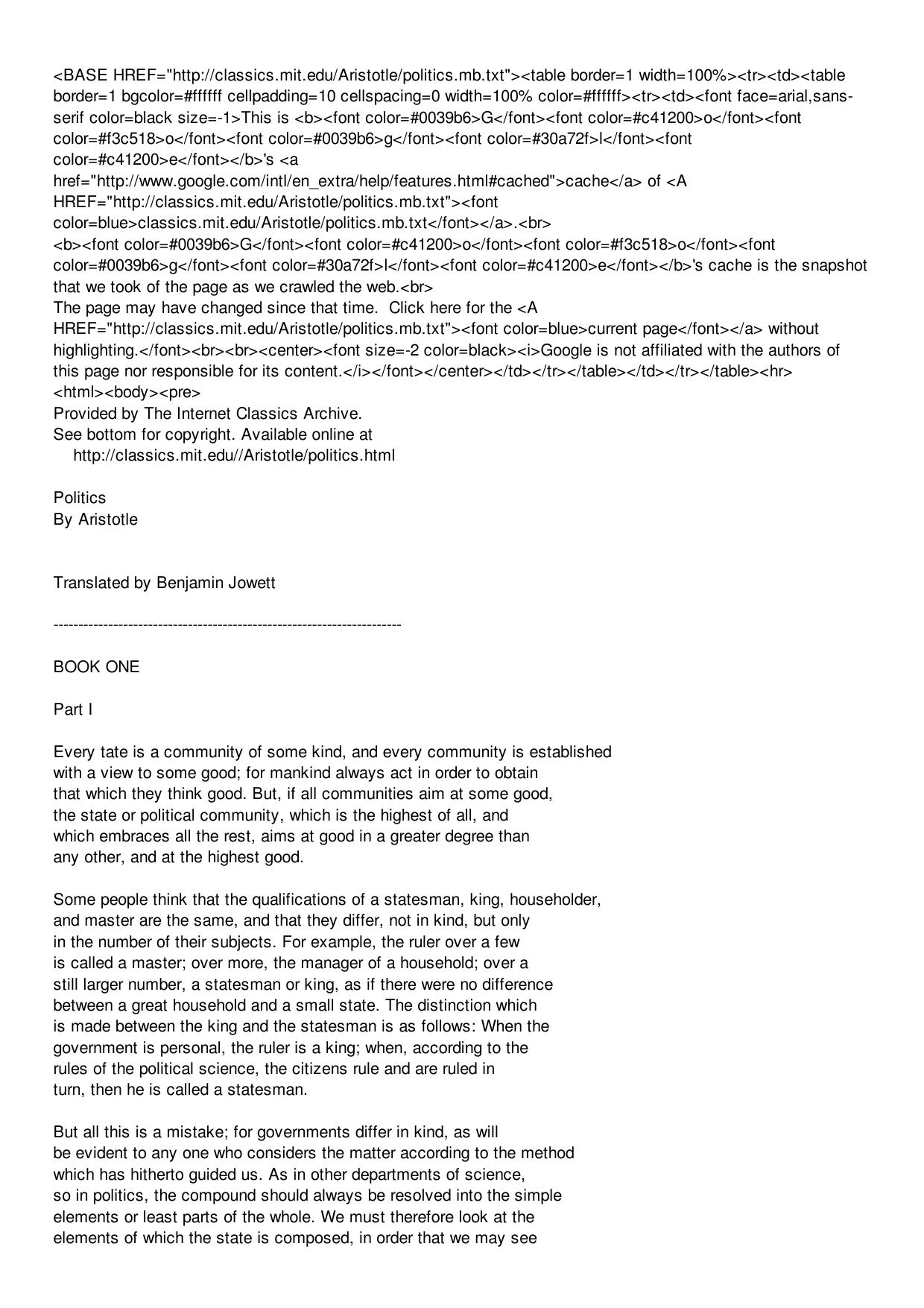Aristotle by Politics

Author:Politics [Politics]
Language: eng
Format: epub, mobi, pdf
Published: 2012-03-28T18:59:49+00:00
What kinds of offices, and how many, are necessary to the existence of a state, and which, if not necessary, yet conduce to its well being are much more important considerations, affecting all constitutions, but more especially small states. For in great states it is possible, and indeed necessary, that every office should have a special function; where the citizens are numerous, many may hold office. And so it happens that some offices a man holds a second time only after a long interval, and others he holds once only; and certainly every work is better done which receives the sole, and not the divided attention of the worker. But in small states it is necessary to combine many offices in a few hands, since the small number of citizens does not admit of many holding office: for who will there be to succeed them? And yet small states at times require the same offices and laws as large ones; the difference is that the one want them often, the others only after long intervals. Hence there is no reason why the care of many offices should not be imposed on the same person, for they will not interfere with each other. When the population is small, offices should be like the spits which also serve to hold a lamp. We must first ascertain how many magistrates are necessary in every state, and also how many are not exactly necessary, but are nevertheless useful, and then there will be no difficulty in seeing what offices can be combined in one. We should also know over which matters several local tribunals are to have jurisdiction, and in which authority should be centralized: for example, should one person keep order in the market and another in some other place, or should the same person be responsible everywhere? Again, should offices be divided according to the subjects with which they deal, or according to the persons with whom they deal: I mean to say, should one person see to good order in general, or one look after the boys, another after the women, and so on? Further, under different constitutions, should the magistrates be the same or different? For example, in democracy, oligarchy, aristocracy, monarchy, should there be the same magistrates, although they are elected, not out of equal or similar classes of citizen but differently under different constitutions- in aristocracies, for example, they are chosen from the educated, in oligarchies from the wealthy, and in democracies from the free- or are there certain differences in the offices answering to them as well, and may the same be suitable to some, but different offices to others? For in some states it may be convenient that the same office should have a more extensive, in other states a narrower sphere. Special offices are peculiar to certain forms of government: for example that of probuli, which is not a democratic office, although a bule or council is. There must be some body of men whose
Download
This site does not store any files on its server. We only index and link to content provided by other sites. Please contact the content providers to delete copyright contents if any and email us, we'll remove relevant links or contents immediately.
| Anthropology | Archaeology |
| Philosophy | Politics & Government |
| Social Sciences | Sociology |
| Women's Studies |
The remains of the day by Kazuo Ishiguro(8999)
Tools of Titans by Timothy Ferriss(8396)
Giovanni's Room by James Baldwin(7346)
The Black Swan by Nassim Nicholas Taleb(7129)
Inner Engineering: A Yogi's Guide to Joy by Sadhguru(6796)
The Way of Zen by Alan W. Watts(6614)
The Power of Now: A Guide to Spiritual Enlightenment by Eckhart Tolle(5782)
Asking the Right Questions: A Guide to Critical Thinking by M. Neil Browne & Stuart M. Keeley(5775)
The Six Wives Of Henry VIII (WOMEN IN HISTORY) by Fraser Antonia(5515)
Astrophysics for People in a Hurry by Neil DeGrasse Tyson(5190)
Housekeeping by Marilynne Robinson(4447)
12 Rules for Life by Jordan B. Peterson(4304)
Ikigai by Héctor García & Francesc Miralles(4274)
Double Down (Diary of a Wimpy Kid Book 11) by Jeff Kinney(4272)
The Ethical Slut by Janet W. Hardy(4253)
Skin in the Game by Nassim Nicholas Taleb(4249)
The Art of Happiness by The Dalai Lama(4130)
Skin in the Game: Hidden Asymmetries in Daily Life by Nassim Nicholas Taleb(4007)
Walking by Henry David Thoreau(3962)
